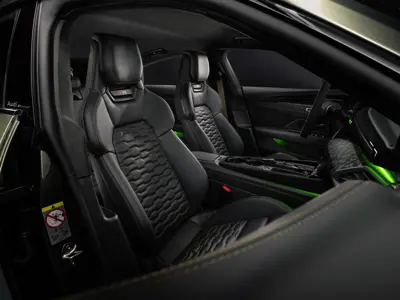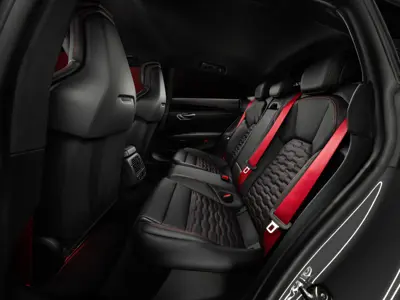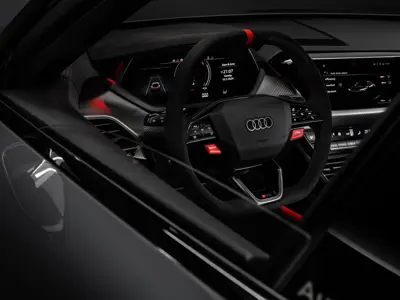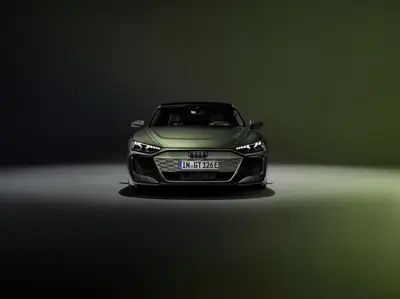Audi RS e-tron GT performance

Audi RS e-tron GT performance is an all-electric luxury sedan offering a WLTP range of up to 598 km (372 miles). EVKX.net has all the details you need.
Audi RS e-tron GT performance
We've organized this article into specific sections for easier navigation. Click the links below to jump to different areas or read on for the full article. Additionally, we offer an overview of the full specifications, an image gallery, detailed information about charging performance, and some online reviews. Our sections include:
Performance
With overboost, the Audi RS e-tron GT performance delivers an astonishing maximum power of 680 kW (925 hp / 912 bhp). Even without overboost, it boasts a formidable 610 kW (829 hp / 818 bhp). The maximum torque reaches an incredible 1027 Nm (758 lb-ft). This powerhouse can rocket from 0 to 100 km/h (0 to 62 mph) in a mere 2.5 seconds and achieves a top speed of 250 km/h (155 mph), underscoring its breathtaking performance.
Audi RS e-tron GT performance
Battery, Range, and Charging
The high-capacity battery has a gross capacity of 105.0 kWh and a net usable capacity of 97.0 kWh, providing a 8.0 kWh buffer (7.6%) for battery protection. Operating at a nominal voltage of 729 volts, it qualifies as an 800-volt battery system. This high voltage is pivotal in enabling the system's charging capabilities.
This Lithium-Ion battery utilizes NMC (Nickel Manganese Cobalt) technology.
Under the WLTP (Worldwide Harmonized Light Vehicles Test Procedure) standard, the vehicle's range varies between 598 to 527 km (372-328 miles), depending on the specific configuration and options, such as wheel size. Larger wheels can increase energy consumption and subsequently reduce the overall range.
The vehicle's energy consumption is rated at 16.2 kWh/100 km for the base model and 18.4 kWh/100 km for the top-tier model under the WLTP test cycle.
For more details about the range, see real-world data and range listings on this model’s range and consumption page.
The vehicle supports fast DC charging with a maximum power of 320 kW. Charging from 0% to 100% takes approximately 47 minutes, while a typical 10% to 80% charge takes about 16 minutes with an average charging speed of 260 kW.
Considering an additional 5 minutes for each charging stop due to driving interruptions, the optimal charging range is from 1% to 65%. This results in an effective charging speed, including time lost, of 209 kW, with each charging session taking about 18 minutes and 48 seconds.
This exceptionally fast charging capability makes the Audi RS e-tron GT performance one of the most efficient and convenient EVs for long-distance travel.
In a 1000 km challenge at a constant speed of 120 km/h (75 mph) with an assumed consumption rate of 22 kWh/100 km, the trip would take about 8 hours and 55 minutes, needing two charging stops from 1% to 65%, totaling 36 minutes of charging time.
Onboard Charger
The standard onboard charger supports up to 11 kW for Level 1 and Level 2 AC charging, allowing a full 0–100% charge in about 8 hours and 49 minutes with a standard home setup.
An optional 22 kW onboard charger reduces the full charge time to approximately 4 hours and 24 minutes.
Charge Port
The charge port is conveniently located on the right front side, facilitating easy access at charging stations where you park parallel to the charger.
Connector types vary by market: this model uses CCS Combo 1 in North America and CCS Combo 2 in Europe. For complete specifications for all markets, refer to the full specifications.
Additionally, a second port on the left front side offers greater flexibility for AC charging.
The connector types vary between different markets. This model uses J1772 for North America and TYPE2 for Europe. For complete specifications for all markets, refer to the full specifications.
Drivetrain
The Audi RS e-tron GT performance features an all-wheel drive system powered by two motors, one on each axle.
The motors used are Permanent Magnet Synchronous Motors.
Suspension
The Audi RS e-tron GT performance features a double wishbone front suspension and a multi-link rear suspension, both equipped with electronically controlled dampers and air springs for enhanced ride quality and adaptability.
The suspension is fully adaptive on the front and rear axle, so height and damping can be adjusted manually and automatically.
The minimum ground clearance is 125 mm, and the maximum is 165 mm.
The Audi RS e-tron GT performance features an optional advanced suspension system with double wishbone front construction and multilink rear construction. It is equipped with active hydraulic dampers on both the front and rear, providing superior ride comfort and handling. The suspension also includes air springs at both ends, allowing for adjustable ride height and improved adaptability to various driving conditions.
The suspension is fully adaptive on the front and rear axle, so height and damping can be adjusted manually and automatically.
The minimum ground clearance is 125 mm, and the maximum is 165 mm.
The Active Suspension maintains the car's body nearly horizontal during dynamic braking, steering, and acceleration, enhancing precise steering response and driver control..
Normally, cars lean outward in corners. However, the active cornering dynamics can counteract this roll, or even overcompensate, making the car lean into bends like a motorcycle.
The Easy Entry function raises the car's body automatically when a door is opened, facilitating easier entry and exit. Once the door closes, the body returns to its previous level.
Steering
Progressive steering is standard on the Audi RS e-tron GT performance, automatically adjusting the steering ratio based on speed for improved control and comfort.
In addition, rear-wheel steering is available as optional feature. Rear wheel steering reduces the turning circle when going slow.
Drive Modes
The Audi RS e-tron GT performance lets the user select different drive modes that affect the car's handling.
The driver can choose between 6 modes:
- Comfort: Balanced steering, normal ride height, balanced throttle, and comfort-oriented suspension damping.
- Dynamic: Dynamic steering, low ride height, and dynamic throttle and suspension damping.
- Effiency: Balanced steering, low ride height, and comfort suspension damping.
- RS1: Dynamic steering, low ride height, and dynamic throttle and suspension damping.
- RS2: Dynamic steering, low ride height, and dynamic throttle and suspension damping.
- Performance: Dynamic steering, low ride height, and dynamic throttle and suspension damping.
Brakes
You can choose between different brake systems.
The Audi RS e-tron GT performance is equipped with cast-iron disc brakes on both the front and rear.
The front discs measure 410 mm, while the rear discs are 365 mm.
The first option brakes uses ceramic discs.
The front discs measure 420 mm, while the rear discs are 410 mm.
Regenerative Braking
The regenerative braking system in this model offers several modes to enhance efficiency and driving experience. The most efficient option is the Automatic Regeneration Mode, where the vehicle coasts when possible and employs regenerative braking to reduce speed as needed.
Manual regeneration is another mode, where regenerative braking is controlled by pressing the brake pedal. The brake system blends in physical brakes only when necessary.
Another option is the Regen on Accelerator Pedal mode where regenerative braking is activated when the driver eases off the accelerator pedal. This system allows the vehicle to slow down and recover energy without the driver needing to press the brake pedal, a feature often referred to as one-pedal driving.
Drivers can also adjust the regenerative braking strength when lifting off the accelerator. There are three levels of regenerative braking to choose from, allowing you to customize the driving experience to your preference.
The maximum regenerative power is 265 kW.
Exterior
The Audi RS e-tron GT performance, with dimensions of 4989 mm in length, 1964 mm in width, and 1396 mm in height, falls into E-segment cars, also known as executive cars, are larger and more luxurious than their D-segment counterparts. They are designed to offer superior comfort, advanced technology, and high performance, making them suitable for a specific set of drivers.
The Audi RS e-tron GT performance is available in a total of 54 paint colors, including pearlescent and metallic options. In addition to the standard palette, some colors are from the exclusive 'Audi exclusive' palette.
The Audi RS e-tron GT performance offers multiple wheel options in different sizes, allowing you to customize your vehicle to suit your style and driving preferences. The available tire and wheel combinations include:
- 225/55 tires on 19" rims front and 275/45 tires on 19" rims rear
- 245/45 tires on 20" rims front and 285/40 tires on 20" rims rear
- 265/35 tires on 21" rims front and 305/30 tires on 21" rims rear
Narrower wheels improve consumption and provide a longer range, while wider wheels offer better traction and handling.
The car has four regular doors and a boot lid for the trunk.
There are three different roof options to select from.
The standard roof includes a large panoramic glass roof extending from the front to the rear, enhancing the interior's spacious and bright feel, thereby improving the mood and comfort of occupants. This glass is tinted to protect against heat from the sun.
Alternatively, you can opt for a panoramic roof with electrochromic glass that can be adjusted to control sunlight.
Additionally, you can order the car with tinted windows from the B-pillar backward, which enhances privacy and reduces glare and heat from the sun, making the interior more comfortable for passengers.
As an option, double-glazed side windows are available to reduce cabin noise, enhancing the overall driving experience.
Audi RS e-tron GT performance
Interior
The Audi RS e-tron GT performance features a driver-focused interior with a luxurious feel, using high-quality materials throughout. The traditional center console separates the driver and passenger, providing convenient storage and functionality.
You can choose between different types of seats, seat materials, and interior styling.
You can choose between several interior designs.
Seats
The Audi RS e-tron GT performance accommodates five passengers with two front seats and a three-seat bench in the rear.
First Row Seats
The front row offers two seat types to cater to various comfort and style preferences:
The following functionalities are available on the sport plus seat:
- Fore-and-aft adjustment (electrically adjustable)
- Recline adjustment (electrically adjustable)
- Height adjustment (electrically adjustable)
- Seat cushion angle adjustment (electrically adjustable)
- Heating
- Memory (standard for driver, not available for passenger)
- Adjustable lumbar support (electrically adjustable)
- Ventilation (optional)
- ISOFIX (standard for passenger seat)
Available in:
- Gray fabric/leatherette upholstering
- Gray/Black Nappa leather upholstering
The following functionalities are available on the sport pro seat:
- Fore-and-aft adjustment (electrically adjustable)
- Recline adjustment (electrically adjustable)
- Seat cushion angle adjustment (electrically adjustable)
- Heating
- Memory
- Adjustable lumbar support (electrically adjustable)
- Backrest side bolsters adjustment
- Seat cushion side bolsters adjustment
- Adjustable thigh support
- Ventilation
- ISOFIX (standard for passenger seat)
Available in:
- Gray fabric/leatherette upholstering
- Gray/Black Nappa leather upholstering
Audi RS e-tron GT performance
Second Row Seat
The second row features a standard three-seat bench with a 40:20:40 split, allowing each section to fold separately to increase cargo space.
Additional functionalities include:
Audi RS e-tron GT performance
Interior Storage
The Audi RS e-tron GT performance provides ample interior storage solutions to enhance convenience and organization:
- Cupholders: Two cupholders are located in the front center console, with an additional two in the rear armrest.
- Glove Compartment: A spacious glove compartment is situated in the dashboard in front of the passenger, ideal for storing essential items.
Interior Lighting
The Audi RS e-tron GT performance offers a range of interior lighting options designed to create a pleasant ambiance and enhance visibility.
- Multicolor Ambient Lighting: This feature extends across the dashboard, door panels, and footwell, providing a harmonious and inviting atmosphere. You can customize the colors to suit your mood or preference, adding a personal touch to your driving experience.
Climate System
There is one climate system available:
- 3-zone climate system: Supports different temperatures in three zones for the driver, passenger, and backseat.
A standard heat pump is included, which can save significant energy that the EV would otherwise use for heating in cold weather.
Comfort Features
The Audi RS e-tron GT performance includes several features to enhance comfort and convenience:
- Electrically Adjustable Steering Wheel
- Easy Entry Function: Moves the driver seat to facilitate easier entry into the car.
- Wireless Phone Charging
User Interface and Control
The control interface of the Audi RS e-tron GT performance combines physical buttons, steering column stalks, and touchscreen displays to create a seamless and intuitive user experience.
This model features a dual-screen configuration, with a dedicated digital instrument cluster for the driver and a central infotainment display integrated into the center console.
Key screen details:
- Driver Information Display: A 12.3-inch screen integrated into the dashboard behind the steering wheel. It provides essential driving data such as speed, range, and navigation prompts.
- Center Console Touchscreen: A 10.1-inch touchscreen located at the top of the center console. It serves as the primary interface for infotainment, navigation, and vehicle settings.
A optional head-up display projects key driving information—such as speed and navigation cues—onto the windshield for enhanced safety and convenience.
Audi RS e-tron GT performance
Steering Wheel
The Audi RS e-tron GT performance is equipped with a single type of steering wheel:
- Circular Steering Wheel: This steering wheel features integrated heating for added comfort during cold weather. It also includes haptic buttons and paddle shifters, allowing you to control the infotainment system, adjust the volume, change music tracks, and manage other key functions with ease.
Mirrors
Both the exterior and interior mirrors use conventional mirror technology to provide a clear view of the area behind the vehicle.
This model comes equipped with voice control as standard, allowing you to manage various functions through voice commands.
Infotainment
The Audi RS e-tron GT performance features a custom-built infotainment system designed to provide a interface with a range of features and functions to enhance the driving experience.
Navigation System
The built-in navigation system uses detailed maps and offers advanced route planning. The system provides real-time traffic information and satellite maps ensuring an efficient and stress-free journey.
App Store
The infotainment system includes an App Store where you can download third-party apps to run natively on the car's screen without needing a connected phone. Available apps vary by market but include popular options such as:
Phone Mirroring
The Audi RS e-tron GT performance supports Android Auto and Apple CarPlay, allowing you to mirror your phone's screen on the car's display. This functionality enables you to run apps like Google Maps or Waze directly from your phone.
Sound System
The Audi RS e-tron GT performance comes equipped with one sound system option:
- Bang & Olufsen Sound System: Features en 16 speakers and delivers a maximum output of 700 watts.
Additionally, the model includes 4 USB-C connections as standard.
Mobile App
The Audi RS e-tron GT performance comes with a dedicated mobile app, available for both Android and iOS devices, allowing you to manage and monitor your vehicle remotely. The app offers a wide range of features designed to enhance your driving experience:
- Locate Your Vehicle: Easily check the current location of your car.
- Preconditioning: Preheat or cool your car before you start your journey for optimal comfort.
- Lock & Unlock: Securely lock or unlock your car doors with a tap.
- Scheduled Charging: Plan and schedule charging sessions ahead of your trips.
- Adjust Charging Target: Set your desired State of Charge to start or stop charging as needed.
- Route Planning: Plan your route and send it directly to your car's navigation system.
- Driving History: Review the details of your past trips.
Lights
You can choose between two types of headlights for the Audi RS e-tron GT performance.
- The standard headlights use LED Matrix technology. LED Matrix is an adaptive system that splits the traditional single headlight beam into dozens of smaller rays that the light controller can turn on and off individually to un-light small areas in front. For enhanced safety, it includes corner lights that illuminate the side when turning.
- LED Matrix Headlights with Laser Technology: Also available as an option, these headlights combine the adaptive features of the LED Matrix system with laser technology for enhanced brightness and range. The light controller can activate or deactivate individual rays to optimize lighting and avoid dazzling oncoming traffic. For enhanced safety, it includes corner lights that illuminate the side when turning.
The taillights use LED technology, ensuring both high visibility and energy efficiency.
Audi RS e-tron GT performance
Advanced Driver Assistance Systems
The Audi RS e-tron GT performance features a range of standard and optional advanced driver assistance systems (ADAS) designed to enhance safety and comfort.
Efficiency Assist: A Standard feature that helps drivers anticipate driving conditions and conserve energy.
Safety Systems
Anti-lock Braking System (ABS): Standard on the Audi RS e-tron GT performance, this system prevents the wheels from locking during braking.
Electronic Stability Control (ESC): Standard on the Audi RS e-tron GT performance, this system improves the vehicle's stability and handling during sudden maneuvers or on slippery road conditions.
Lane-Keeping Assist (LKA): Standard on the Audi RS e-tron GT performance, this system helps prevent the vehicle from drifting out of its lane.
It also includes a Lane Departure Warning system to alert the driver if the vehicle veers out of the lane.
Front Cross Traffic Assist (FCTA) : Standard on the Audi RS e-tron GT performance, this driver assist system that helps drivers detect oncoming traffic when crossing an intersection or turning left or right from a stopped position.
Rear Cross Traffic Alert (RCTA): Standard on the Audi RS e-tron GT performance, this system uses sensors to detect approaching vehicles from the side when backing out of a parking space or driveway.
Forward Collision Warning (FCW): Standard on the Audi RS e-tron GT performance, this driver assist system helps drivers avoid or mitigate frontal collisions.
Automatic Emergency Braking (AEB): Standard on the Audi RS e-tron GT performance, this system autonomously applies the brakes to prevent or reduce the severity of a collision if the driver does not react in time.
Automatic Emergency Steering (AES): Standard on the Audi RS e-tron GT performance, this system assists in avoiding collisions by automatically steering the vehicle in an emergency.
Blind-spot Monitoring (BSM) : Standard on the Audi RS e-tron GT performance, this side assist system helps to detect traffic in blind spots.
Exit Warning: Standard on the Audi RS e-tron GT performance, this system alerts occupants if there is a risk of opening a door into an oncoming object or person if there is a risk of hitting something.
Driving Automation
With the standard Assistantpackage Tour level 2 system, you get the following driving automation features.
- Adaptive Cruise Control (ACC)
- Lane Centering Assist (LCA) /AutoSteer: keeps the car in your lane and slows down if needed in traffic. The system limits how long you can drive without touching the steering wheel.
- Automatic parking. (optional)
Sensors & Cameras
This model uses cameras, radar, and ultrasonic sensors for its driver assist systems.
Up to five radar sensors, five cameras, and en 12 ultrasonic sensors monitor the vehicle’s surroundings.
Safety
The Audi RS e-tron GT performance is equipped with multiple airbags to ensure occupant protection in the event of a collision. The airbag system includes:
- Front airbags for the driver and front passenger
- Side curtain airbags for both the first and second rows
- Side airbags for the driver and front passenger
- Side airbags for the second-row passengers
The front and rear seatbelts are equipped with reversible pretensioners and load limiters. In the event of a collision, the pretensioners tighten the seatbelts to secure occupants firmly in their seats, while the load limiters allow a controlled amount of webbing to extend, reducing the risk of injury from excessive force.
Security and Access Technologies
The Audi RS e-tron GT performance is equipped with advanced security features to protect you and your vehicle. These include:
- Keyless Entry and Start: With the standard keyless start and optional keyless entry, you can unlock and start the vehicle seamlessly without removing the key from your pocket or bag.
- Alarm System: An optional integrated alarm system monitors for unauthorized entry or tampering, providing alerts to help deter intrusions and enhance vehicle security.
Cargo Capacity and Towing Ability
The trunk offers a cargo capacity of 405 liters (14.3 CU FT).
On the roof, you can load up to 75 kg (165.3 lbs).
Additionally, there is a frunk (front trunk) with a storage capacity of 85 liters (3.0 CU FT).
The vehicle’s maximum weight is 2860 kg (6305 lbs), with a base weight of 2340 kg (5159 lbs). This allows for a maximum load of 520 kg (1146 lbs), including the driver and passengers. Note that some options may increase the base weight and reduce the maximum loading capacity.
This model is not available with a towbar. So, to pull a trailer, you must look at other models.
Availability & Pricing
The Audi RS e-tron GT performance had its world premiere on 6/18/2024, with deliveries starting in September 2024.
Alternative Models
Compare These Vehicles
Get detailed side-by-side comparisons of specifications, range, charging performance, and travel capabilities.
Complete Specs
Compare all technical specifications side-by-side
Range Analysis
Real-world range and charging performance
Travel Calculator
Plan trips and compare travel times








